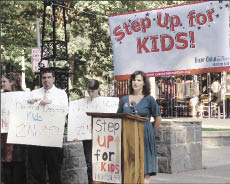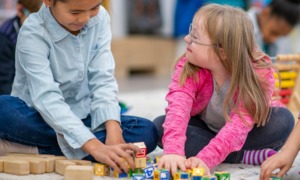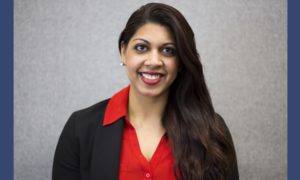 |
|
Stepping up: Youths and youth advocates rallied at a playground in Portland to raise awareness of key issues. Photo: Children First for Oregon |
Every Child Matters Education Fund(ECMEF), a youth advocacy organization, announced that it will seek to have youth policy questions asked during the presidential debates between Sens. Barack Obama (D-Ill.) and John McCain (R-Ariz.).
“Beginning today, we are asking the debate moderators to ask the candidates their plans for addressing the needs for America’s children,” said ECM founder and CEO Mike Petit at the organization’s Step Up 4 Kids Day news conference in Washington.
If he could have one question asked about youth matters, Petit said, it would be “what the candidates would do to increase the investment in youth” within the federal budget.
If the question were limited to a single issue, he said, “I’d ask what they are going to do about SCHIP [the State Children’s Health Insurance Program].”
Congress approved an expansion of SCHIP twice in the current session; President Bush vetoed both versions. On the first bill, in May 2007, Obama voted for the expansion and McCain did not vote. Neither was present to vote when it came up again in November.
Every Child Matters, which has been educating voters in nine states on child-related policy matters, will contact moderators and the Commission on Presidential Debates in the effort to get at least one youth policy question asked during the debates.
The best opportunities for a youth-related question will be the last two presidential debates: the Oct. 7 town hall at Belmont University in Nashville, Tenn., and the Oct. 15 debate at Hofstra University in Hempstead, N.Y. (The first debate, in Oxford, Miss. on Sept. 26,focused on foreign policy.)
The town hall debate host, Tom Brokaw of NBC News, will take questions from audience members; so securing seats at the debate is the best way to get children on that agenda.
The Oct. 15 debate will focus entirely on domestic policy, and the questions will be developed by moderator Bob Schieffer of CBS News, according to the Commission on Presidential Debates.
“We’re more than happy to have any group send us research or questions,” Kaylee Hartung, Schieffer’s assistant, said in an interview . “Ultimately [Schieffer] will decide the questions, but we’re more than happy to take input.”
(Hartung said any other youth advocate can reach her with information or questions at hartungk@cbsnews.com.)
ECM will host a “Debate Kids Rally” at the sites of the second and third presidential debates and at the vice presidential debate, Oct. 2 in St. Louis. At the first presidential debate, in Oxford, ECM was to host a Kids Convention that was to include youth from every public school in Mississippi.
Petit said he is frustrated with both parties, because he believes they have largely ignored children’s issues.
“Is it too much to ask that a little time be devoted by John McCain, Barack Obama, and the media to the severe conditions of millions of U.S. children?” Petit wrote in an opinion piece published in early September by the Lowell (Mass.) Sun and The Telegraph, of Nashua, N.H. “The needs of these children are almost invisible in the 2008 presidential campaign. In that way, the issue of the children is being neglected in much the same way that the children are themselves.”
Step Up 4 Kids Day, on Sept. 16, was orchestrated by ECM and co-sponsored by 30 national organizations to increase media and voter attention to issues affecting youth in each state.
Some state coordinators organized parades or rallies. Most of the events wound up at state capitol buildings or at city halls, and featured speakers from advocacy organizations and state agencies and elected officials.
In Oregon, youth and supporters gathered at a Portland playground for the day’s event because the state capitol building was closed due to a recent fire.
“For us, the biggest is Ballot Measure 59,” said organizer Ben Leftwich, a policy assistant for Children First for Oregon. The measure would allow taxpayers to write off federal taxes on their state tax returns, which Leftwich said could cost the state up to $2.4 billion in revenue and force cuts in child services and education.
Petit, of ECM, also runs a separate 527 organization called Vote Kids, which in the past two election years has used its resources to expose the youth policy track records of certain House and Senate candidates.
Vote Kids has been dormant so far during the 2008 election cycle. But Petit said the group recently received additional funds (its 2007 tax return shows assets of $11,000), and is considering action in the coming weeks.






























